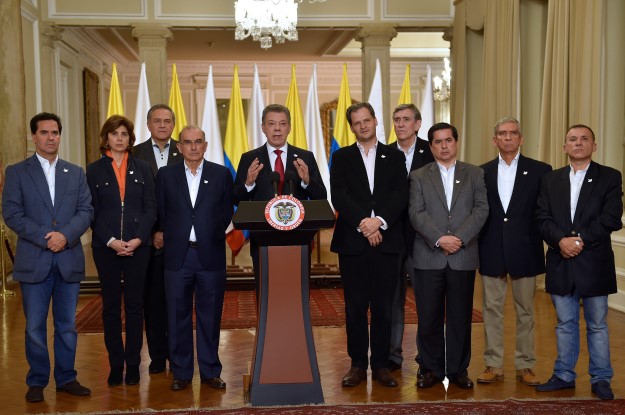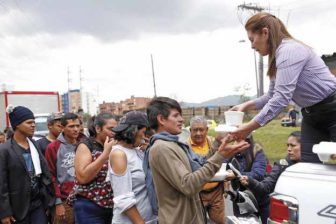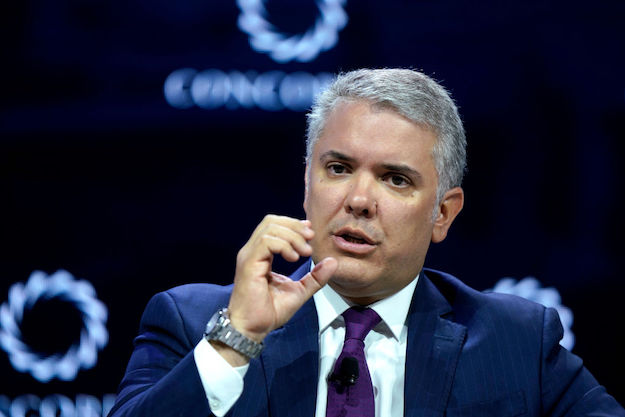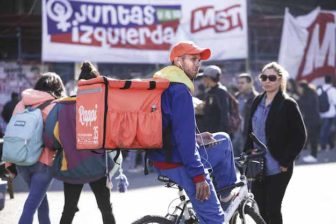It was a shock result. But a reexamination of why Colombians voted “no” to a peace deal with the Revolutionary Armed Forces of Colombia (FARC) by a margin of just 54,000 votes on Sunday sheds some light on why almost all pundits got it wrong – and what might happen next.
Here are six reasons why the “no” won:
1. Washington is not Medellín. If you only listened to foreign pundits or some within the Obama administration, you would have thought the plebiscite was going to pass by an 80 percent margin. But the peace deal was always vastly more popular abroad than it was in Colombia. President Juan Manuel Santos knew this – and it’s why he and surrogates traveled numerous times to the United States to commemorate key moments in the negotiations and try to present peace as a fait accompli, hoping his fellow Colombians would follow suit.
Santos is a journalist himself, a scion of a wealthy family and a graduate of the University of Kansas with perfect English. His critics say he’s more comfortable speaking to people in Virginia than in, say, Antioquia. I think that’s unfair – Santos did win two national elections – but he clearly failed to convince enough Colombians to both support peace and leave their homes to vote for it (turnout was just 37 percent). Meanwhile, Santos’ overreliance on international public opinion reinforced the (incorrect, but pervasive) perception within Colombia that he pursued a deal not for the good of the nation, but because he wanted a Nobel Peace Prize for himself.
2. Sorry, but it really was a lousy deal. Even some people who voted “yes” had profound misgivings about the terms. The deal would have granted a thoroughly discredited Marxist rebel army with just 5,800 soldiers five guaranteed seats in both houses of Colombia’s Congress for several years to come. Most controversially, FARC commanders – even the ones who ordered atrocities throughout the 52 years of conflict – would have been allowed to escape prison. The terms for implementation would have committed the Colombian government to spend an estimated $31 billion to $90 billion over the next decade – or between 0.8 percent and 2.4 percent of Colombia’s annual economic output. Even with the government’s probably generous estimate that a Colombian economy at peace would grow an increased 1 percent a year, that was a lot of money.
Santos recognized this was tough for Colombians to swallow, but said it was the best deal possible. But this was debatable, because the FARC had been on the run militarily for many years thanks to relentless Colombian military offensives. Meanwhile, Santos and his surrogates spent four years at the negotiating table. It was hard to escape the perception Santos wanted a deal too badly – and got shaken down. The government’s strategy of keeping the most controversial terms of the negotiations secret, and then publishing the final proposal mere weeks before the plebiscite, also fed the belief that Santos was trying to shove a bad deal down Colombians’ throats. In the end, they refused.
3. Venezuela is imploding. You may ask: What the hell does this have to do with Colombia? But former Colombian president Álvaro Uribe, Santos’ rival and the peace deal’s main opponent, repeatedly said that voting “yes” would put Colombia on the path to narco-chavismo – a drug cartel-dominated state that would become more like the Venezuela of the late Hugo Chávez.
This, on the surface, was ridiculous – Santos is a classic center-left leader with a modern, free-market economic philosophy. But the charge resonated with voters nonetheless. And the truth is that land under coca cultivation in Colombia has absolutely exploded in recent years, growing an estimated 40 percent in 2015 alone, with most of the growth coming in rebel-dominated territory. This scared many Colombians who, of course, don’t need Netflix to remind them how awful Pablo Escobar was for their country. As for the Chávez part – Colombia shares a long border with Venezuela, and many cultural ties as well, so it has watched in abject horror over the past year as Venezuelans starve and go without basic medical goods because of chavismo’s stupidity. If you were going to choose a bogeyman to scare Colombians, this was it. Venezuelan opposition leaders were some of the most energetic objectors to the FARC deal. Social media also helped spread plenty of lies.
4. Colombians really – I mean, really – hate the FARC. Approximately half of all Colombians have lost a family member to violence over the years. The FARC’s legacy is truly atrocious – 220,000 dead as a result of their insurgency, many years when kidnappings and bombings were everyday occurrences, and as many as 5 million people displaced from their homes (more than 10 percent of the country). The Colombian military, as well as other armed groups including paramilitaries, have done awful things over the years as well. But I think it’s fair to say many Colombians reserve the darkest place of their heart for the FARC. Accepting peace was always going to be hard.
The deal’s proponents note that on Sunday, “yes” prevailed in regions of the country where FARC violence has been highest over the years, while “no” won in relatively peaceful areas such as Antioquia. But it just wasn’t enough – especially since many pro-Santos voters stayed home, perhaps in the belief their side would win easily.
5. It’s the economy, st… well, you know. Colombia’s economy has struggled in recent years, partly because of low prices for oil and diminished demand for its commodities from China. Unemployment is 9 percent, and the peso has fallen sharply against the dollar since the talks began in 2012. Partly as a result, Santos’ approval rating fell to around 20 percent this year – an awful position of weakness to be negotiating (and then “selling”) such a difficult deal. Many Colombians believed he was too occupied with peace negotiations to manage the economy properly. They punished him in kind.
6. It’s 2016. Whether it’s Brexit, Donald Trump, Rodrigo Duterte, Poland, Brazilian mayoral elections, or seemingly wherever else you look – the ideological right is on the rise. Smarter people than I am can try to explain why this is happening in so many different places. But those of us in big cities keep getting our predictions wrong. One consistent issue is turnout – the right is simply more energized, and gets out more effectively, which means traditional polls may be useless on Election Day. That happened in Colombia. Maybe it will happen again in the United States next month.
—
Finally, a brief word on what’s next. Uribe and his surrogates say they now want to sit down and renegotiate a “better” peace deal with tougher terms. Santos has said he will continue to fight for peace until the “last day” of his government, and sit down with the opposition to try to figure out a way forward. FARC leaders, meanwhile, have said they will stick to their ceasefire agreement for now – and many within their rank and file do appear to want peace. This has all raised the hope that perhaps there is still a short-term path to peace.
I’m not optimistic. Colombian history shows us that the stars align for peace negotiations once every decade or so – the last earnest talks happened in the early 2000s. Even if the result of Sunday’s vote had been reversed, Santos would have found himself well short of the overwhelming support he needed to implement the deal properly. It is hard to imagine how FARC commanders who have already made huge concessions and celebrated a deal in public will now sit back down to renegotiate with new input, and tougher demands, from people in Uribe’s camp. It is hard to imagine how a weakened Santos, who bet his entire legacy on peace, will be able to move forward – especially in a world that appears to be shifting against him.
But everybody’s gotten Colombia wrong before. Maybe it will happen again.









